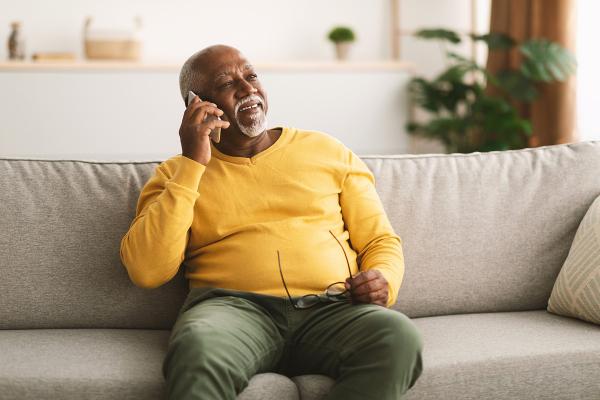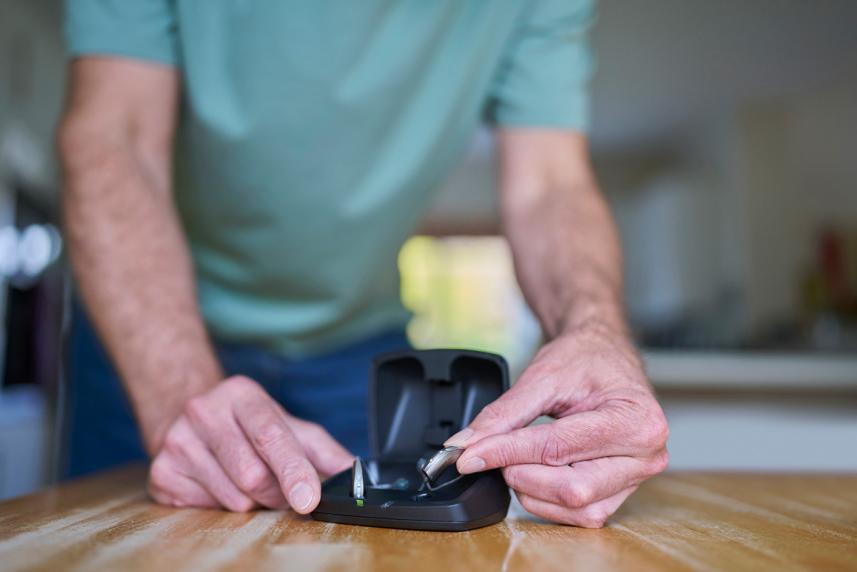
It may be time to get your hearing checked. AARP Hearing Solutions makes it simple. Find a provider today.
It’s a common issue, but there are solutions that can help you keep track of your devices. Read on for expert advice.

Do you tend to misplace your hearing aids? That panicky feeling when you realize they’re not in their charging station or storage case is no fun. (Wait, where did I put them?) Then you find them sitting next to the sink, or on your desk, or in your pocket.
Keeping track of your devices doesn’t need to be stressful, says Lindsey Koble, Au.D. She’s the owner of Audiology Always in Auburn, Indiana, and a member of the UnitedHealthcare Hearing advisory board. The key is to build a consistent daily routine and stick with it.
Use our expert troubleshooting tips to establish good storage habits so you remember where your hearing aids are.

It may be time to get your hearing checked. AARP Hearing Solutions makes it simple. Find a provider today.
Putting in your hearing aids is probably part of your morning routine. You do it as you start your day, the same way you brush your teeth, put on your glasses, check your phone and feed the dog.
Get into a regular habit when you remove your devices too. “When you go to sleep at night — or if you take your hearing aids out during the day — put them in the same place all the time,” Koble says.
Don’t store them in the bathroom, where moisture can be an issue, Koble says. Most hearing aids have rechargeable batteries, so they need to be put in a charging station each night.1 Good spots to recharge your devices include:
“Leave that charger there all the time,” Koble says. That’s where you place your hearing aids any time you take them out during the day. (If you have hearing aids with disposable batteries, simply keep your case in that same regular spot.)
Set a recurring alert on your phone that pings just before bedtime or put a sticky note on your bathroom mirror.2 It will remind you to check that you’ve put your hearing aids in their designated place for the night.
Use a carrying case with a lid when you’re away from home. Keep it in your purse or bag so it’s always available. This is a key accessory for active people, who might take out their hearing aids when they go to the gym, go swimming or play pickleball, Koble says.
Try not to throw your hearing aids loose in your bag. And don’t put them in your pocket, where you could forget about them and wash them by mistake.
“Put them in that carrying case in your purse or gym bag and get in a routine. Every time you take them out, they go directly into the case,” Koble says. Be sure to stow the case in a safe place in your bag too.
Some hearing aid manufacturers include a carrying case when you buy hearing aids. Or you can buy an inexpensive case online.
Never leave your hearing aids (or your storage case) on a low table where a curious child or pet could pick them up. That’s a sure way to lose your devices. You don’t want them getting mixed in with your grandchild’s toys or damaged because your dog chews them.
Lying down for a nap? Take off your hearing aids first and place them in their storage spot. It’s all too easy for your hearing aids to fall out when you’re sleeping. They could get lost in the sheets or between the couch cushions.
Most hearing aids have Bluetooth connectivity (including many models from Relate®, UnitedHealthcare Hearing’s brand). You could try the “Find my hearing aids” function on your app to help you locate your devices in your house, car or bag. If you think you’ve lost your devices for good, call your hearing care professional. They can help you figure out the next steps.
As an AARP® member, you get a trial period and upfront pricing — plus you can select the level of care that fits your needs. Learn more.
Sources
Information is for educational purposes only and is not a substitute for the advice of a licensed medical provider. Consult your provider prior to making changes to your lifestyle or health care routine.
AARP Hearing Solutions is available to all AARP members and does not require a health insurance plan from UnitedHealthcare. The AARP hearing program discount cannot be combined with any other discounts, promotions, coupons or hearing aid benefit plans unless noted herein. Products or services that are reimbursable by federal programs including Medicare and Medicaid are not available on a discounted or complimentary basis. AARP commercial member benefits are provided by third parties, not by AARP or its affiliates. Providers pay a royalty fee to AARP for the use of its intellectual property. These fees are used for the general purposes of AARP. Some provider offers are subject to change and may have restrictions. Please contact the provider directly for details. UnitedHealthcare Hearing is provided through UnitedHealthcare, offered to existing members of certain products underwritten or provided by UnitedHealthcare Insurance Company or its affiliates to provide specific hearing aid discounts. This is not an insurance nor managed care product, and fees or charges for services in excess of those defined in program materials are the member's responsibility. UnitedHealthcare does not endorse nor guarantee hearing aid products/services available through the hearing program. This program may not be available in all states or for all group sizes. Components subject to change.
Relate® is a registered trademark of Ear Professionals International, LLC and is manufactured by Sonova. For assistance, if needed, or to report unexpected operations or events please contact Sonova at [email protected].